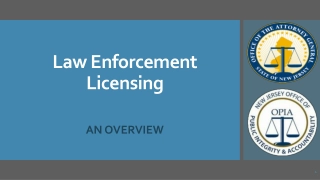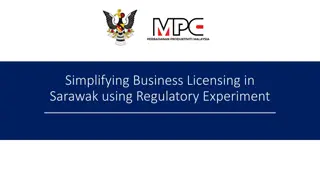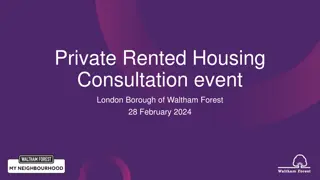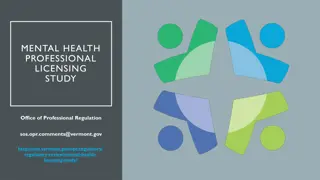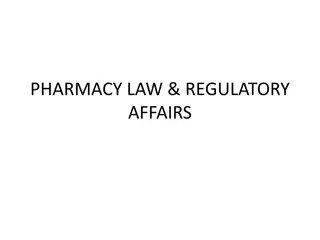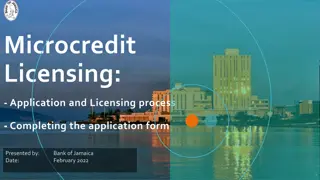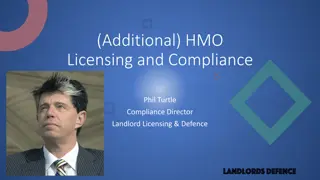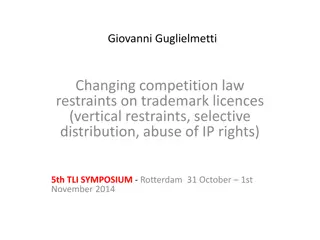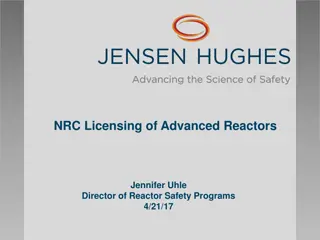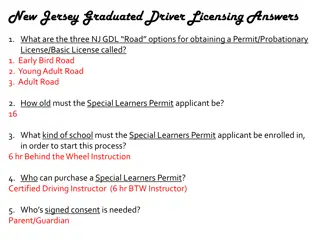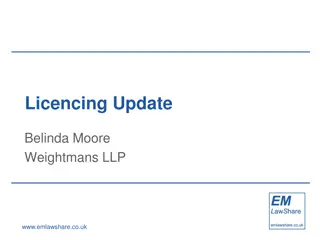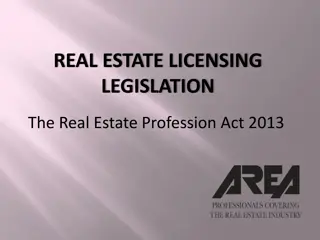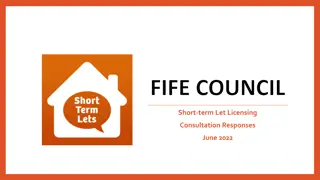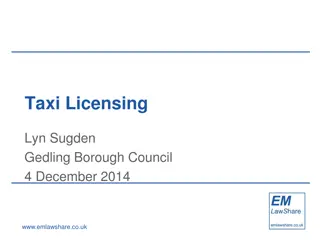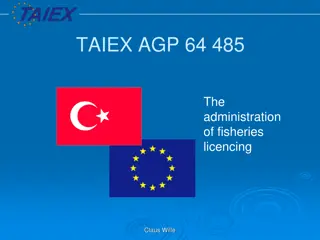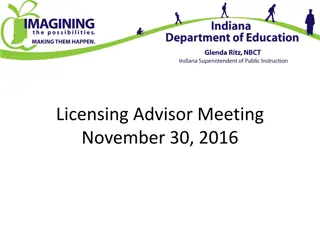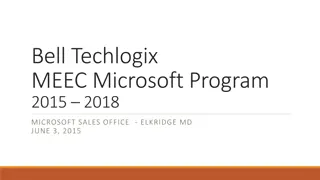Understanding the Practice of Law and Licensing Requirements
Exploring the practice of law, the unauthorized practice of law, the public interest considerations, and the activities that constitute legal practice according to the Supreme Court Committee on the Unauthorized Practice of Law. It delves into the essential aspects of legal profession, defining legal activities, and the importance of licensing in New Jersey.
- Legal practice
- Licensing requirements
- Unauthorized practice of law
- Public interest
- Professional disciplines
Download Presentation

Please find below an Image/Link to download the presentation.
The content on the website is provided AS IS for your information and personal use only. It may not be sold, licensed, or shared on other websites without obtaining consent from the author. Download presentation by click this link. If you encounter any issues during the download, it is possible that the publisher has removed the file from their server.
E N D
Presentation Transcript
Do I Need a License for That? Do I Need a License for That? Tips From the Supreme Court Tips From the Supreme Court Committee on the Unauthorized Committee on the Unauthorized Practice of Law Practice of Law Carol Johnston Secretary, Committee on the Unauthorized Practice of Law October 10, 2018
What is the Practice of Law? Functional Definition The practice of law in New Jersey is not limited to litigation. . . . One is engaged in the practice of law whenever legal knowledge, training, skill, and ability are required. In re Jackman, 165 N.J. 580, 586 (2000). [T]he practice of law relates to the rendition of services for others that calls for the professional judgment of a lawyer. Committee on the Unauthorized Practice of Law Opinion 22, 103 N.J.L.J. 246 (March 22, 1979). In determining what is the practice of law, it is well settled that it is the character of the acts performed and not the place where they are done that is decisive. The practice of law is not, therefore, necessarily limited to the conduct of cases in court but is engaged in whenever and wherever legal knowledge, training, skill and ability are required. Stack v. P.G. Garage, Inc., 7 N.J. 118, 120-21 (1951).
What is the Unauthorized Practice of Law? Advisory Opinions Relating to the Unauthorized Practice of Law - Rule 1:22-2(a) Two-Part Process is the conduct the practice of law? if yes, is it in the public interest to prohibit non-lawyers from engaging in the conduct?
The Public Interest The question of what constitutes the unauthorized practice of law involves more than an academic analysis of the function of lawyers, more than a determination of what they are uniquely qualified to do. It also involves a determination of whether non-lawyers should be allowed, in the public interest, to engage in activities that may constitute the practice of law. In re Opinion No. 26 of the Committee on the Unauthorized Practice of Law, 139 N.J. 323, 327 (1995).
Overlap of Professional Disciplines [I]n cases involving an overlap of professional disciplines we must try to avoid arbitrary classifications and focus instead on the public s realistic need for protection and regulation. In re Application of New Jersey Society of CPAs, 102 N.J. 231, 237 (1986).
Activities That Are the Practice of Law Providing Legal Advice Providing legal advice Applying facts to the law [A]ll advice to clients, and all actions taken for them in matters connected with the law, constitute the practice of law. Appell v. Reiner, 81 N.J. Super. 229, 336 (Ch. Div. 1963), rev d on other grounds, 43 N.J. 313 (1964)
Activities That Are the Practice of Law Providing Legal Advice Determining that a claimant is entitled or eligible to receive compensation for injuries or interpreting and applying a statute of limitations is the practice of law. UPL Committee Opinion 32 (April 27, 1998) Providing information to customers of debt resolution service about potential defenses to a collection suit is rendering legal advice to litigants. UPL Committee Opinion 36 (January 15, 2001)
Activities That Are the Practice of Law Representing Another Person Representing another person in court or in a quasi-judicial forum (including planning or zoning boards, ethics committees, etc.) is practice of law. Rule 1:21-1(b); UPL Committee Opinion 21 UPL Committee Opinion 50 (2013) - a nonlawyer holding a power of attorney is not authorized to act as a lawyer licensed in the State of New Jersey. A power of attorney does not permit a nonlawyer to provide legal services or advice, or to represent the principal in any judicial or quasi-judicial forum.
Activities That Are the Practice of Law Representing Another Person Arbitrations Representing a party in an arbitration or mediation is the practice of law. UPL Opinion 43 (2007); RPC 5.5(b)(3)(ii)
Doing Preliminary Work in Legal Matter Property Tax Appeals A company that solicited homeowners to file property tax appeals, gathered necessary paperwork, conducted comparative appraisals, and then arranged with an attorney to handle the appeal before the County Tax Board was engaging in the unauthorized practice of law. UPL Opinion 25 (1992).
Debt Collection - Threatening Legal Action Debt Collection When a collection agency sends a letter to a debtor threatening legal action or implying that the collection letter is sent at the direction of a lawyer, the agency is engaging in the unauthorized practice of law. UPL Joint Opinion 48 / ACPE Opinion 725 (2012) and UPL Opinion 8 (1972)
Administrative Contested Cases or Agency Matters Other Rule 1:21-1(f) Exceptions Rule 1:21-1(f) permits non-lawyers to represent parties in Office of Administrative Law and administrative agencies in certain specified cases, and only if the person does not receive a fee for the representation (meaning, the person is employed by the party or a union): union representatives may appear in civil service cases and employment relations proceedings; nonlawyer may appear in special education proceedings; nonlawyer may appear in unemployment appeals, to represent the claimant or employer.
Negotiating Terms of Legal Document Mortgage Modification Negotiating the terms of a legal document such as a mortgage as an advocate for another person is the practice of law, but licensed debt adjuster or HUD-certified housing counselor may engage in such conduct. UPL Joint Opinion 45 / ACPE Opinion 716 (2010)
Preparing legal documents Wills Former legal secretary advised a friend by amending his will, changing language in the will, drafting entirely new provisions for the will. Found to be unauthorized practice of law. In re Estate of Margow, 77 N.J. 316 (1978) Corporate Documents Preparing legal documents such as corporate operating agreements is the practice of law, but CPAs may engage in this task provided they inform their clients that the assistance of legal counsel would be advisable. UPL Committee Opinion 47 (2011)
Preparing Legal Documents Real Estate Conveyancing Documents Preparation of deeds, notes, mortgages, releases, affidavits, and other legal documents affecting the title to real estate is the practice of law. New Jersey State Bar Assn. v. Northern New Jersey Mortgage Associates, 32 N.J. 430, 444 (1960) Preparing real estate sale and lease contracts for a third person is the practice of law. But licensed real estate brokers and salespersons may craft contracts for the sale of residential real estate, a task that is the practice of law, provided certain conditions, including an attorney- review clause in the contract, are met. New Jersey State Bar Assn. v. New Jersey Assn. of Realtor Bd.s, 93 N.J. 470, 472 (1983).
Preparing Legal Documents Drafting legal documents that convey real estate for a third person is the practice of law. But Court permits South Jersey practice where nonlawyers or lawyers for title insurance company draft the legal documents, with required notices and disclaimers given to the parties to the transaction. In re Opinion No. 26 of the Committee on the Unauthorized Practice of Law, 139 N.J. 323, 336 (1995). An out-of-state lawyer may not represent a New Jersey resident in the purchase of real estate in New Jersey. UPL Opinion 1, 91 N.J.L.J. 657 (October 10, 1968). An out-of-state lawyer may not prepare a deed to convey New Jersey real estate. The Committee reasoned that the clear intent of his act in the preparation of a deed to convey real estate in New Jersey is to affect real property, the parties and their respective rights and duties as governed by the laws of the State of New Jersey and [t]he laws of New Jersey governing real estate often differ materially from the laws of foreign states. UPL Opinion 17, 95 N.J.L.J. 568 (June 26, 1975).
NJ Inheritance Tax Returns Estate and Inheritance Tax Returns Preparation and filing of NJ inheritance tax return is considered the practice of law, but a CPA can perform this task if the client has been notified in writing before the CPA begins work on the return that review of the return by a qualified attorney may be desirable because of the possible application of legal principles in the preparation of the tax return. In re Application of New Jersey Society of CPAs, 102 N.J. 231 (1986) Enrolled agents who are licensed by the United States Internal Revenue Service (IRS) may, like lawyers and certified public accountants (CPAs), prepare and file New Jersey Transfer Inheritance Tax returns for clients provided that the client is notified in writing before the enrolled agent begins work on the return that review of the return by a qualified attorney may be desirable because of the possible application of legal principles in the preparation of the tax return. UPL Committee Opinion 51 (March 2014)
Medicaid Application Assistors Medicaid Applications and Medicaid Advisors UPL Committee Opinion 53 ( Non-Lawyer Medicaid Advisors (Including Application Assistors ) and the Unauthorized Practice of Law ) (May 16, 2016) The federal program requires States to permit non-lawyers to assist applicants and beneficiaries with Medicaid applications. While non-lawyer Medicaid advisors may provide these limited services, it is the unauthorized practice of law when non-lawyers provide advice in matters that require the professional judgment of a lawyer. Only a lawyer may provide legal advice on issues such as strategies for Medicaid eligibility, including provisions of wills and powers of attorney; on the need for guardianships and the authority to transfer assets; on nursing home laws; on transfers of property; on the impact of marriage and divorce; and on estate administration and the elective share.
Do-It-Yourself Legal Kits Helping Fill Out Do-It-Yourself Legal Kits [A]lthough the sale of Do-it-Yourself kits is permissible, and [] a non- lawyer seller may assist the purchaser by typing, transcribing, or translating, the rendering of any other assistance with the preparation, review, analysis, or completion of materials included in these kits in person, in writing, electronically, or otherwise constitutes the unauthorized practice of law and is therefore prohibited. UPL Opinion 40, 176 N.J.L.J. 1195 (June 21, 2004). LegalZoom, Rocket Lawyer, and Other Sophisticated Do-It-Yourself Forms Companies have sophisticated computer programs to create legal documents. If no legal advice or consultation on what to say when filling out the form, then sale of form is not unauthorized practice of law.
Other Activities Serving as Arbitrator or Mediator Serving as a third-party neutral (mediator or arbitrator) is the practice of law if the third-party neutral is a lawyer, but is not the unauthorized practice of law if the third-party neutral is not a lawyer. Joint ACPE Opinion 676 / CAA Opinion 18 (April 4, 1994)
Paralegals Paralegal Work Paralegals do engage in the practice of law but it is not the unauthorized practice of law if the paralegal is directly supervised by an attorney. In re Opinion No. 24 of the Committee on Unauthorized Practice of Law, 128 N.J. 114, 123 (1992). If supervision by lawyer is illusory because the attorney knows nothing about the field in which the paralegal is working, paralegal is engaged in the unauthorized practice of law. Id. at 127. Court further held that a paralegal may not offer his or her services to the general public. Rather, an independent paralegal must offer services to the attorney, and it is the attorney who offers legal services to the general public.
What is Not Not the Practice (or Unauthorized Practice) of Law? Teaching Law A person may discuss legal principles without being considered to be engaging in the practice of law but if the person counsels or advises another person with respect to specific legal matters giving legal advice by applying legal principles to the person s specific problem -- then a line is crossed. Cannot respond to a specific question by applying legal principles to the specific facts presented.
What is Not Not the Practice (or Unauthorized Practice) of Law? Non-Legal Professionals Discussing the Application of the Law Human Resources personnel who discuss employee benefit planning are not engaging in unauthorized practice of law though they are using legal knowledge or discussing law. Human Resources / Employee Benefits Nonlawyer industrial relations and personnel management specialist not engaging in unauthorized practice of law when advising company on policy issues. Auerbach v. Wood, 142 N.J. Eq. 484, 485-86 (E. & A. 1948) Consultants
What is Not Not the Practice (or Unauthorized Practice) of Law? Corporate Investigation Corporate investigation (without including recommendations); when a lawyer conducts an investigation the lawyer draws on legal knowledge to focus the process of sifting information, but investigating is not, by itself, providing legal services. Factual findings would be applied to the law to determine whether company policy or relevant statutes were violated. This secondary task, the application of facts to the law, clearly is a legal task that must be performed by a duly-licensed New Jersey attorney. The preliminary task of gathering the facts through an internal investigation and questioning of witnesses is not the unauthorized practice of law.
Out-of-State Lawyers Out-of-State Lawyers Practicing in New Jersey Pro Hac Vice Admission, Rule 1:21-2 Limited License for In-House Counsel, Rule 1:27-2 Volunteers for Certified Pro Bono Organization, Rule 1:21-3(c)
Multi-Jurisdictional Practitioners Multi-Jurisdictional Practitioners, RPC 5.5 Intended to permit occasional forays into NJ by out-of-state lawyers. Appearances before Office of Administrative Law (pro hac vice via OAL regulation); Appearances before Administrative Agencies (if permitted in R. 1:21- 1(f) or else need to qualify as multi-jurisdictional practitioner under RPC 5.5)
Multi-Jurisdictional Practitioners RPC 5.5(b)(3): lawyer negotiates terms of transaction for existing (non-NJ) client and transaction relates to jurisdiction where lawyer is licensed; lawyer represents party in arbitration or mediation and services are related to lawyer s practice in jurisdiction where lawyer is licensed; lawyer investigates, engages in discovery, interviews witnesses or deposes witnesses in New Jersey for proceeding pending or anticipated to be instituted in jurisdiction where lawyer is licensed; lawyer s practice in NJ is occasional and lawyer associates in a matter with, and designates and discloses to all parties in interest, a lawyer admitted to the Bar of this State who shall be held responsible for the conduct of the out-of-State lawyer in the matter circumstances other than in (i) through (iv); practice activity arises directly out of lawyer s representation on behalf of existing client in jurisdiction where lawyer is admitted to practice, practice is NJ is occasional ; and lawyer s disengagement would result in substantial inefficiency, impracticality or detriment to client. Multijurisdictional practitioners must register with Clerk of Supreme Court and pay annual assessment. See UPL Opinion 49.
Out-of-State Lawyers Out-of-State Lawyer Practicing from Office in New Jersey Lawyers Practicing From an Office in New Jersey Must be Licensed in New Jersey A New Jersey firm is presumed, for all purposes, to consist of lawyers who have been admitted to practice in the State of New Jersey. ACPE Opinion 223 (December 23, 1971).
Out-of-State Lawyers A lawyer admitted only in a different jurisdiction, such as New York, may not practice law from an office in New Jersey. In re Jackman, 165 N.J. 580, 588 (2000) ( our public policy assur[es] the lay public that only those properly approved for bar admission in New Jersey may render legal services here ). Even if a lawyer is advising clients solely on the law of a foreign jurisdiction, such as New York, the lawyer is considered to be practicing law in New Jersey if the legal services are rendered by a lawyer who has established a New Jersey office. Rule 1:21-1(a) ( no person shall practice law in this State unless that person is an attorney holding a plenary license to practice in this State . . . . ).
Out-of-State Lawyers [T]he Constitution does not require that because a lawyer has been admitted to the bar of one State, he or she must be allowed to practice in another. Leis v. Flynt, 439 U.S. 438, 443 (1979).
Out-of-State Lawyers New Jersey Office of Multi-State Firms Must be Staffed Only by New Jersey Licensed Lawyers [O]ut-of-state lawyers who have not been admitted to the bar here in accordance with the rules of our Supreme Court are not authorized to conduct a practice in New Jersey, either on their own or through the subterfuge of New Jersey-licensed associates who are little more than names on a letterhead. . . . The rule is not a protectionist measure, but rather a measure rationally related to the legitimate state concern of preventing deception. ACPE Opinion 550 (January 24, 1985) (quoting In re Professional Ethics Advisory Committee Opinion 475, 89 N.J. 74, 91, app. dism. sub nom. Jacoby & Meyers v. Supreme Court of New Jersey, 459 U.S. 962 (1982)).
Out-of-State Lawyers practice law in this State to the entire legal staff of the out-of-state law firm each attorney must be individually licensed to practice law in New Jersey. UPL Opinion 33 (July 13, 1998), modified (as to certain bond transactions) In re Opinion 33, 160 N.J. 63 (1999) Opening an office in New Jersey does not grant a license to Model RPC 5.5(b)(1): A lawyer who is not admitted to practice in this jurisdiction shall not . . . establish an office or other systematic and continuous presence in this jurisdiction for the practice of law. While New Jersey has not adopted this language in its Rule of Professional Conduct 5.5, the prohibition already is set forth in the Advisory Opinions and Jackman case.
Out-of-State Lawyers Out-of-State Lawyer Practicing Solely Federal Law Model Rule of Professional Conduct 5.5(d)(2): A lawyer admitted in another United States jurisdiction, and not disbarred or suspended from practice in any jurisdiction, may provide legal services in this jurisdiction that: . . . (2) are services that the lawyer is authorized to provide by federal law or other law of this jurisdiction. Model RPC 5.5(d)(2) has been interpreted to permit an out-of-state lawyer to open an office in-state for the practice of federal law. G. Hazard, Jr., W. Hodes, P. Jarvis, The Law of Lawyering (3d ed.) Section 46.10, page 46-30 (2010).
Out-of-State Lawyers The federal practice exception is supported by the Restatement of the Law (Third), American Law Institute Section 3, page 24 (2000): A lawyer currently admitted to practice in a jurisdiction may provide legal services to a client . . . (2) before a tribunal or administrative agency of . . . the federal government in compliance with requirements for temporary or regular admission to practice before that tribunal or agency; and (3) at a place within a jurisdiction in which the lawyer is not admitted to the extent that the lawyer s activities arise out of or are otherwise reasonably related to the lawyer s practice under Subsection . . . (2). UPL Opinion 44 (2008) grants a limited federal (immigration) practice exception -- but the out-of-state lawyer must be associated with a New Jersey admitted lawyer because immigration practice often involves corollary State law practice (criminal, family) New Jersey does not currently require out-of-state lawyers practicing federal law from offices in New Jersey to register as multi-jurisdictional practitioners; New Jersey has not adopted Model Rule of Professional Conduct 5.5(d)(2).
Most Pernicious UPL Committee Grievances notarios & immigration practitioners Internet paralegals and document doctors do-it-yourself store fronts out-of-state lawyers offering mortgage modification debtors lawyers in national law firms property tax consultants out-of-state lawyers with out-of-state clients in NJ real estate matters


